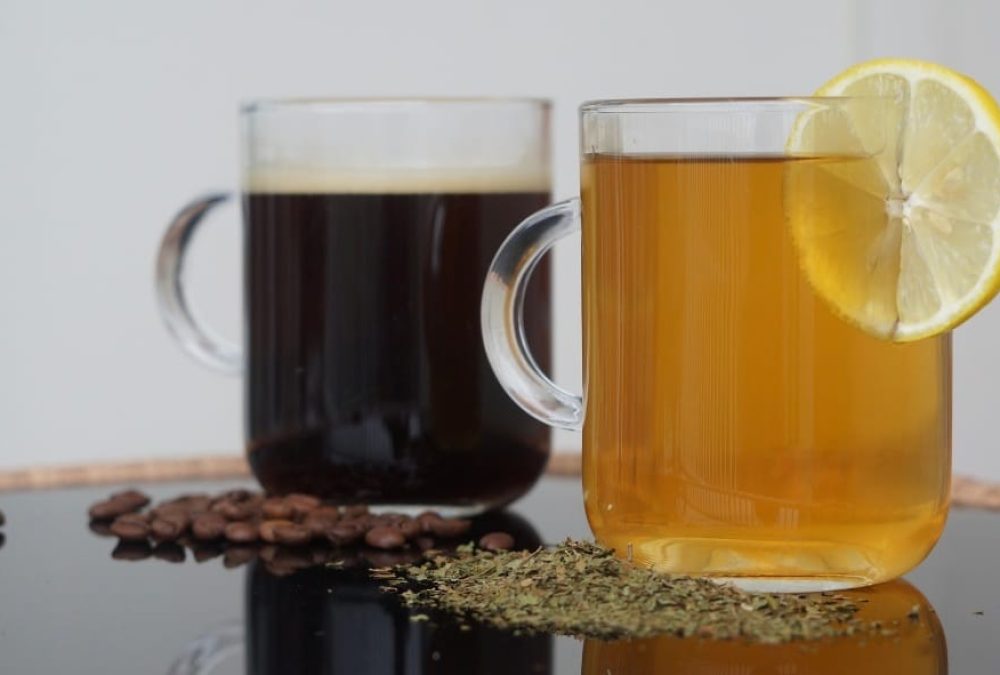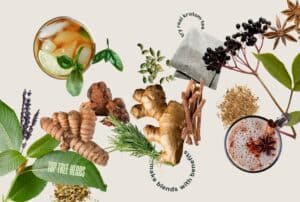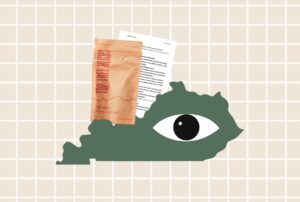The question of coffee vs tea is one I’ve asked myself often. Usually, this question comes to me when I am on my third cup of coffee, fifth cup of tea, or when my hands have sweat running down them and yet my brain is still foggy. Caffeine tolerance can be frustrating, and may lead to overconsumption.
If this is you, comparing tea vs. coffee will not get you very far. The fermented leaves of Camellia sinensis and the roasted beans of Coffea arabica both contain caffeine as their primary active alkaloid.
If you have a massive caffeine tolerance, or you react poorly to caffeine in general, switching between these two options is unlikely to make much of a difference.
Caffeine has been incredibly impactful, and I do not intend to run its good name through the dirt. But as Aristotle cautioned two millennia ago: “all things in moderation.” Caffeine is good, but it’s possible to get too much of a good thing.
But fear not! The natural wonders of the world did not put all their energizing eggs in one basket. Because the evolution of all life on Earth stems from common amino acids, much of our brain chemistry looks like plant alkaloids! As a result, there are other options out there for natural energy boosters.
It Runs In the Family: Coffee and Kratom
Let me introduce you to the distant cousin of coffee, the Mitragyna speciosa tree, also known as kratom. Both Coffea arabica and MItragyna speciosa are members of the Rubiaceae family of plants. It’s arguably one of the coolest plant families out there.
Coffee and kratom have a lot in common aside from their botanical relation. They both are desired for their alkaloids that resemble neurotransmitters. (They’ve also both been countercultural drinks of choice—coffee was once illegal and consumed in secret.)
Caffeine is structured similarly to adenosine, a molecule in your body that’s related to digestion and drowsiness. Regarded as an adenosine blocker, caffeine exerts it’s energizing and mood boosting effects in a consistent and reliable way.
Kratom’s primary active alkaloids are all indole alkaloids. Indole alkaloids, simply, are a broad category of molecules that are built around a similar scaffold, called the indole ring.
Mitragynine, the most frequently cited alkaloid for the effects of kratom, is no exception. It’s indole shape is important because many of our most important neurotransmitters are also indoles, such as serotonin and melatonin.
In another twist of fate, mitragynine’s three dimensional shape twists in such a manner so as to mimic endorphin!
This is all to say, coffee is a great natural energy booster, but it’s not the only option!
Kratom Tea
Kratom has long been brewed into a tea to give a boost to weary laborers. In Thailand, where kratom is native and has many centuries of documented use, it is common to find it incorporated into the diet’s of locals.
Men and women in Thailand generally use kratom to promote a sense of well being and energize them after lunch. In a 2013 qualitative study on kratom users, the researchers interviewed many male kratom users. One of them, a 70 year old blacksmith, had this to say about kratom:
I can forge iron, make a big knife and axe all day because of chewing krathom [sic]. If I don’t chew it, I cannot raise the hammer. Krathom helps me work in a hurry when I need to finish my work on time.
Saingam et al. 2013
This general sentiment toward kratom was present through the rest of the interviews. People love kratom for its effects. (Also, as the spelling hints in the above quote, there are dozens of ways to pronounce kratom.)

How to Make Kratom Tea
If you’ve decided you’d like to give kratom tea a shot, you’ll need to know how to make it. Like any tea, you’ll first need to get your kratom. We’ve made this easy for you and put the kratom in tea bags. We recommend white vein kratom for when you’re switching from caffeine.
Next, you’ll want to squeeze some lemon juice over your tea bag in a mug. Any freshly squeezed ctirus fruit will do. Really, we just want the natural acids (i.e. citric acid) to help with the extraction of the alkaloids. The fruity sweetness also helps cut back on some of the earthy, bitter notes.
Next, pour boiling water over your tea bags and cover while it steeps for 20 minutes. We find it works best if you use a thermos to maintain the high temperatures necessary for a strong cup.
If you don’t have a thermos, your best bet is putting your tea bags and natural acid into your kettle or pot and let simmer for 20 minutes.
After that, you can add sugar or honey to taste. In fact, we have seasonal recipe books dedicated to helping you find your favorite cup!
A Way to Pair Coffee and Tea with Kratom
In the not so distant past, when I was still a tired, sleepless undergraduate student, I drank too much coffee. And not just coffee, I also took caffeine pills. On days that I wouldn’t take caffeine pills, I could easily go through 40 ounces of coffee in a day. In total, I estimate I was using almost 700 mg of caffeine daily.
Coupled with my regular habit of not leaving the library until 3 am and getting around 4 hours of sleep a night, my anxiety levels were rocketing. My hands would sweat endlessly and anytime I sat down my restless legs would dance about.
I knew something had to change, and when I serendipitously came across kratom from watching Hamilton’s Pharmacopeia, I decided to give it a shot. I liked the energy that it gave me, and soon I was alternating days when I was drinking kratom tea vs. coffee. Monday coffee, Tuesday kratom, Wednesday coffee, and so on. I didn’t need to increase my kratom serving size to get the benefits I was looking for. Eventually, I needed far less coffee to feel energized as well. Gradually, I regained a healthy caffeine tolerance again.
I eventually came to learn the benefits of a proper sleep regimen. Yet I have still maintained this kratom tea and coffee alternating schedule. When I keep my tolerance low for both caffeine and kratom, I get the best out of both of them with absolutely no side effects.
If you’re interested in jumping in and trying kratom tea, then there are a great deal of information you can explore on when to drink kratom tea and other purposes that kratom tea is good for.
It’s great to read through these resources, because the routine that works for me may not be the same as the one that works for you. It’s also incredibly important to speak with your physician, especially if you have any medical conditions or are taking any medications.
Tea vs. Coffee: Conclusion
I hope you better understand the false coffee vs. tea binary, and find herbal beverages you like which can energize your weary bones! Tea and coffee are both great, but if you’re raising this comparison because you’re experiencing side effects from caffeine, the answer has to come from outside the box—and inside the kratom tea box. Try kratom tea today!





